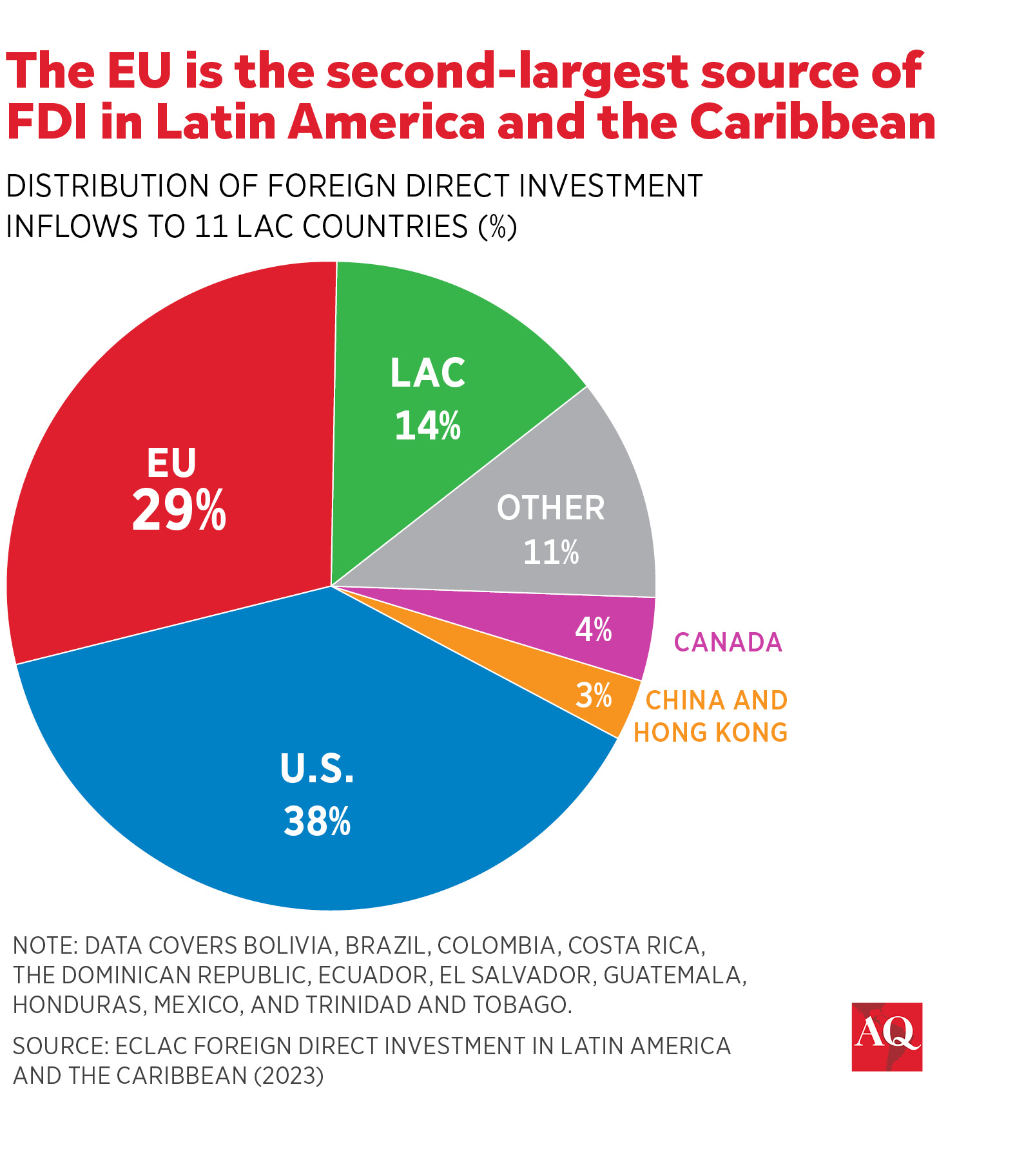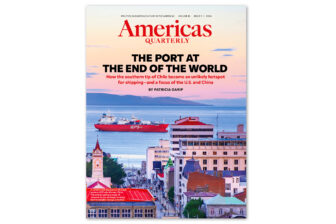During her first presidential campaign in 2017, Marine Le Pen addressed a roaring crowd in the southeastern city of Lyon, blasting the policy of globalization and open borders. “Our leaders chose globalization, which they wanted to be a happy thing. It turned out to be a horrible thing,” she said on behalf of the invigorated French right. Since then, the narrative has become more popular in the political sphere of the so-called old continent, and last week’s European Union elections confirmed the trend.
The significant rise in support for the far right in the EU Parliament’s elections didn’t bring them a majority, as the centrist coalition will maintain control, but their heightened influence—with 18% of the total 720 seats—may well spark concerns about the potential impact in several countries and regions worldwide. For Latin America, there are good reasons to monitor the repercussions. Trade, immigration and investment issues in the Western Hemisphere could be seen in a new light with the EU’s legislative-level changes.
The European Parliament holds substantial legislative, budgetary and supervisory powers. As a co-legislator with the Council of the European Union, the Parliament can propose, amend and veto legislation across various policy areas. Additionally, the Parliament exercises oversight over EU institutions, especially the European Commission, where it can approve or dismiss the Commission and holds the power to censure it. It also holds budgetary authority, enabling it to approve, amend or reject the EU’s long-term and annual budgets, and it can approve or reject international trade agreements.
The changes in the Parliament’s composition can lead to shifts in trade policies, development aid and cooperation initiatives. The new Parliament could potentially affect the flow of resources to Latin American nations to support stringent human rights, democratic and environmental standards in the region.
The EU-LAC reverberations
The EU’s rightward shift will be underscored in July, when Hungary’s far right president, Viktor Orbán, will assume the rotating presidency of the Council of Ministers, the EU’s most powerful decision-making body comprising heads of government. Orbán’s presidency might shift the EU’s stance on some critical issues, given his party’s controversial positions on migration and climate, affecting EU and Latin American countries’ trade and economic relations, environmental initiatives and the allocation of development aid and cooperation programs.
The election result in Europe will have significant ripple effects on the EU’s economic relations with Latin America and the Caribbean (LAC). According to the European Parliamentary Research Service, in 2022 trade between the EU and the Community of Latin American and Caribbean States (CELAC) reached nearly $328 billion, placing CELAC as the EU’s fifth-largest trade partner, following the U.S. and China.
The same year, Latin America and the Caribbean received $224.6 billion in foreign direct investment (FDI), a 55.2% increase compared to 2021, positioning the EU as the second-largest investor (29%) just behind the U.S. (38%), according to the Economic Commission for Latin America and the Caribbean (ECLAC). Sectors like manufacturing, energy and banking have seen substantial EU investment. However, an EU tilt towards economic nationalism could incentivize European firms to redirect investment to the domestic market, starving LAC of vital capital inflows.

The rise of right-wing factions could also reshape the stance on climate change, migration and economic policies towards the region. More influence for climate-skeptical parties like the Netherlands’ Party for Freedom, led by Geert Wilders, could diminish the EU’s role as a global leader in combating climate change and threaten projects like an EU collaboration with CELAC on the EU-LAC Global Gateway Investment Agenda, which aims to boost renewable energy capacity in the region. EU funding and expertise for such projects could decrease, threatening conservation and sustainability efforts in LAC that rely on this support.
Meanwhile, shifts at the national level in Europe towards a nationalistic economic agenda, prioritizing domestic companies over foreign competition—like Giorgia Meloni’s “Italy First” economic agenda or France’s Rassemblement National promotion of protectionism—could jeopardize existing trade agreements between the EU and LAC. Diplomatic and trade relations with economic and political blocs like Mercosur, the regional integration initiative comprising Argentina, Brazil, Paraguay, Uruguay, and Venezuela, could be profoundly disrupted. The EU-Mercosur deal was already frozen; in March French President Emmanuel Macron called it a “very bad deal”, referring to the lack of stronger climate commitments. It seems the results of the EU Parliament elections might have sealed its fate.
Migration represents another potential flashpoint. The EU’s humanitarian aid has helped Latin American nations like Colombia and Ecuador respond to the Venezuelan migration crisis. Earlier this year, the EU Commission set aside almost €130 million in humanitarian aid for the region. In Central America, €17 million will support the response to major humanitarian crises, largely stemming from chronic violence and high numbers of displaced people, and Haiti will receive €20 million in humanitarian aid through the recently launched Humanitarian Air Bridge. However, an ascendant far right could prioritize curbing immigration over providing aid, rupturing cooperative channels.
What’s next?
The rise of far right populism in both Europe and Latin America is characterized by charismatic leaders who use anti-establishment rhetoric and prioritize law and order. Leaders such as Le Pen and Meloni have garnered support by positioning themselves as outsiders challenging the political elite and promising strict immigration controls and new economic policies.
In Latin America, Javier Milei and Nayib Bukele exemplify this trend. Milei’s libertarian and bold stances appeal to voters frustrated with the status quo, allowing him to push radical reforms in Congress even without a majority. Meanwhile, Bukele’s anti-crime policies have helped him consolidate power and maintain popularity despite concerns about human rights violations.
Even if the centrist coalition maintains control in the EU Parliament, the far-right’s higher representation may bring consequences for critical areas in Latin America—and at this stage, issues like trade, investment, climate cooperation, and migration are certainly the most exposed. Only time will tell the intensity of the repercussions now in motion.









